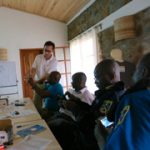I remember my feelings of shock and helplessness after learning about traumatic fistula, which – in addition to its debilitating physical symptoms – leads victims to be shunned and isolated from their communities. Traumatic fistulas are common in conflict and post-conflict settings, and are often the result of violent rape coupled with deliberate damage, including the insertion of sharp objects. When I first read about this condition, I thought of the countless women who not only endured terrifying sexual violence, but who continue to suffer long after, physically and emotionally. There is a dire need for increased, direct medical services for these women to repair their fistula and treat other health consequences of rape.
Dr. Denis Mukwege of Panzi Hospital in the Democratic Republic of the Congo (DRC) – a dear partner and colleague of Physicians for Human Rights (PHR) – rightfully highlights that those who are raped suffer its consequences for long after the sexual assault takes place. In an interview with the New York Times, Dr. Mukwege says, “To treat women for the first time, second time, and now I’m treating the children born after rape. This is not acceptable.” To successfully combat endemic sexual violence, medical, legal, and law enforcement professionals must work together to ensure that survivors not only receive justice, but can live without fear of repeated attacks on themselves or their families. The reoccurrence of sexual violence can only end once perpetrators know that their crimes will be documented, prosecuted, and punished.
As a student of public health, I recognize the need for a more streamlined, community-level approach to ending brutal rape in conflict. We must first end the culture of impunity that allows crimes of sexual violence to go unpunished and encourages perpetrators to rape again. As an intern with the Program on Sexual Violence in Conflict Zones at PHR, I am proud to be a member of a team that is working to build local capacity for the forensic documentation of such violent crimes. By training over 650 individuals from the health care, legal, and law enforcement communities in DRC and Kenya, PHR is enabling these professionals to work together to more effectively collect, document, and utilize evidence that can lead to successful prosecutions. Ensuring accountability helps individual victims feel a sense of justice (including the receipt of reparations, which can help attain necessary services, such as fistula repair surgery), but it also impacts the entire community and region by deterring perpetrators from carrying out additional acts of violence.
As the international community draws much-needed attention to violence against women through its 16 Days of Activism against Gender Violence this month, it is essential that we continue to raise awareness of the widespread use of sexual violence in conflict, and continue the fight for justice and accountability. Only then can we prevent additional suffering.

